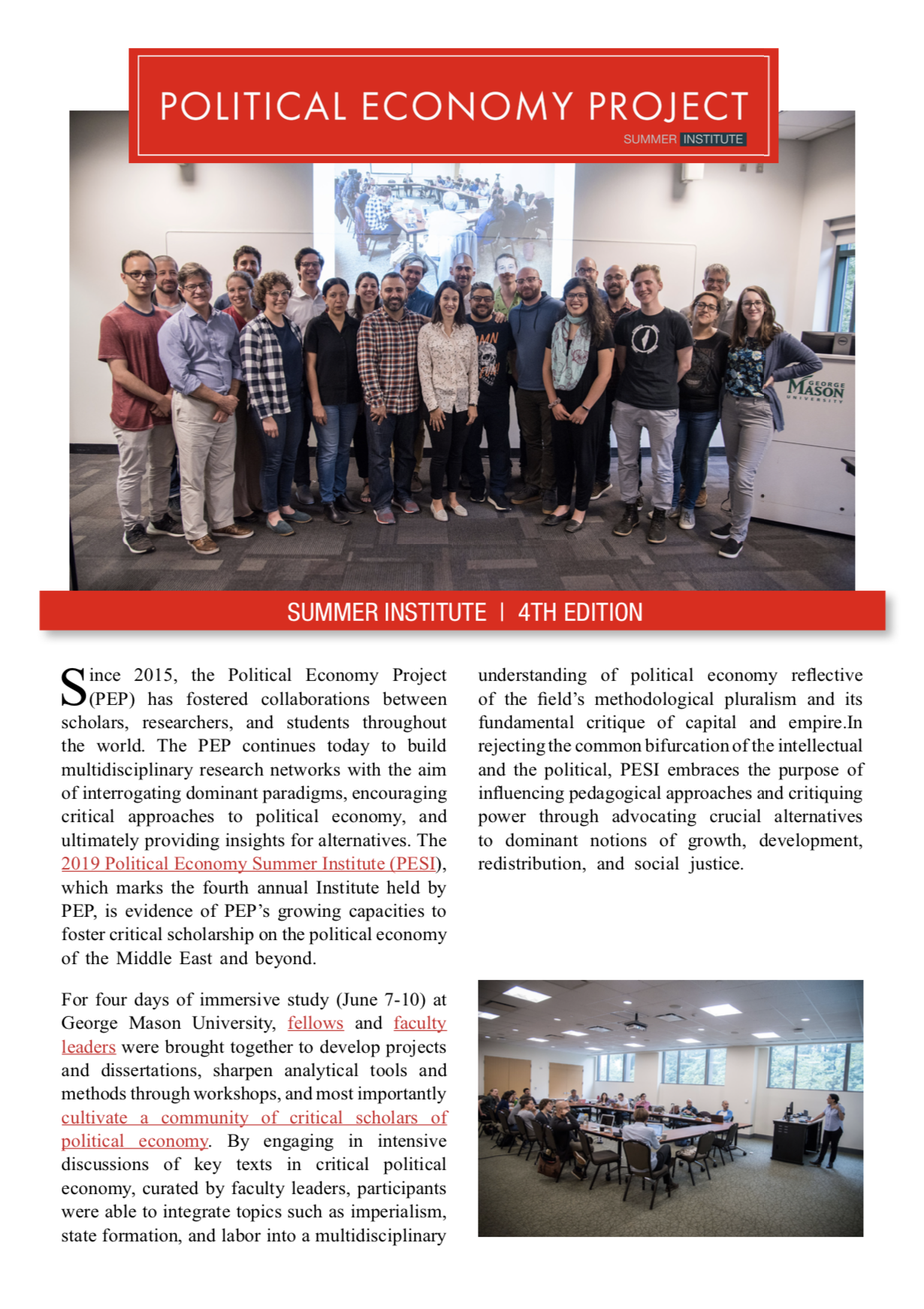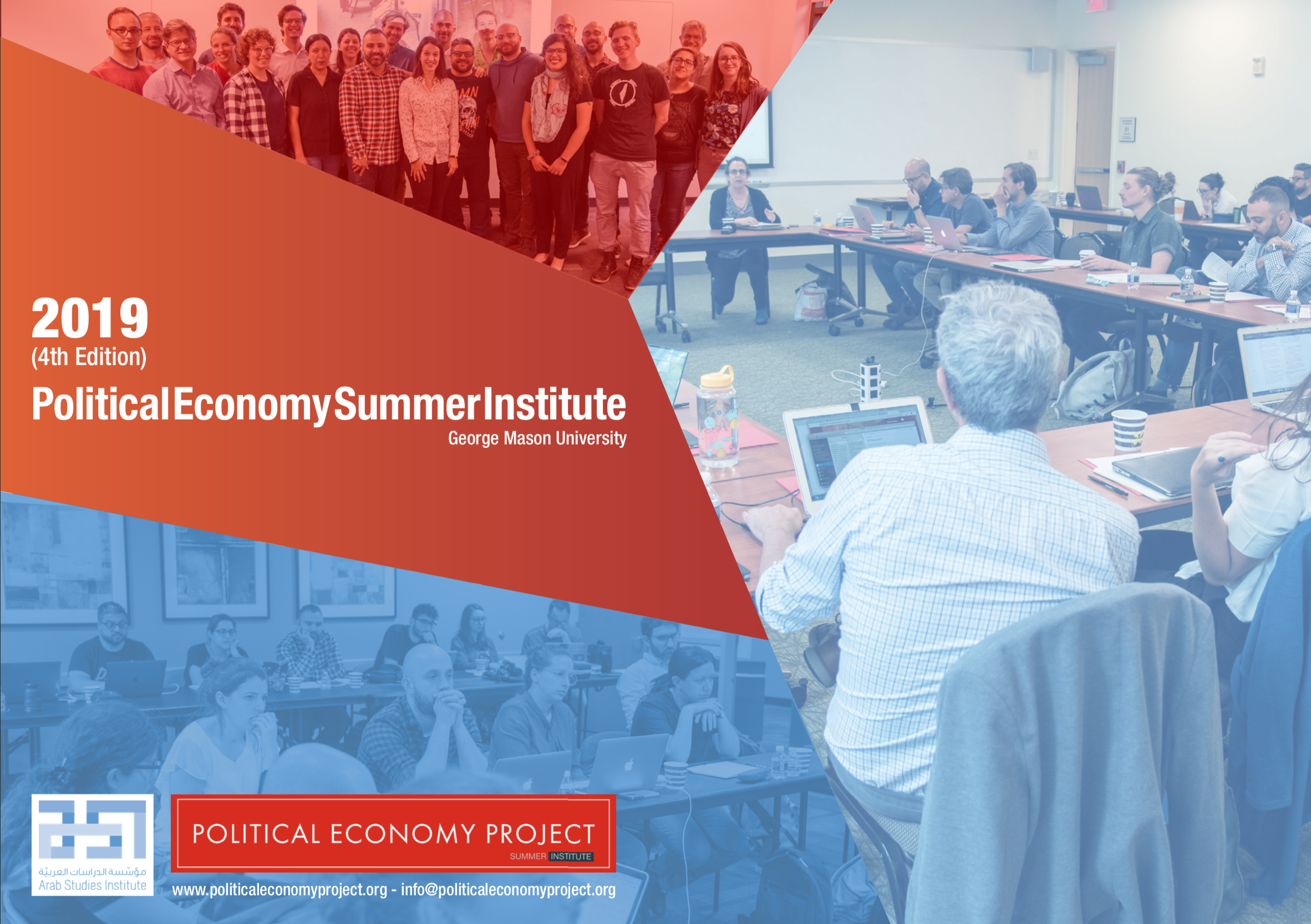[The deadline for applying to the Summer 2020 Political Economy Summer Institute is 31 October 2019. The call for proposals can be found here.]
Since 2015, the Political Economy Project (PEP) has fostered collaborations between scholars, researchers, and students throughout the world. The PEP continues today to build multidisciplinary research networks with the aim of interrogating dominant paradigms, encouraging critical approaches to political economy, and ultimately providing insights for alternatives. The 2019 Political Economy Summer Institute (PESI), which marks the fourth annual Institute held by PEP, is evidence of PEP’s growing capacities to foster critical scholarship on the political economy of the Middle East and beyond.
For four days of immersive study (June 7-10) at George Mason University, fellows and faculty leaders were brought together to develop projects and dissertations, sharpen analytical tools and methods through workshops, and most importantly cultivate a community of critical scholars of political economy. By engaging in intensive discussions of key texts in critical political economy, curated by faculty leaders, participants were able to integrate topics such as imperialism, state formation, and labor into a multidisciplinary understanding of political economy reflective of the field’s methodological pluralism and its fundamental critique of capital and empire. In rejecting the common bifurcation of the intellectual and the political, PESI embraces the purpose of influencing pedagogical approaches and critiquing power through advocating crucial alternatives to dominant notions of growth, development, redistribution, and social justice.
[Click on the image above to download the PESI 2019 Report.]
The PESI 2019 began with Julia Elyachar of Princeton University, leading a workshop on post-colonialism and political economy of the Middle East. Considering the perception of post-colonial studies as a Foucauldian turn away from Marx, Elyachar countered that there is no inherent friction between post-colonialism and political economy, though she also concedes there is no inherent congruence either. The central question, then, is how to internalize the lessons of post-colonialism within a framework rooted in political economy. Remarking on the need for innovative approaches to both fields, Elyachar challenged participants to ponder how to create new agents of history and how revolt relates to social structure.
In the second session, Muriam Haleh-Davis of UC-Santa Cruz covered racial capitalism. Through a collaborative group exercise, Haleh-Davis was able to demonstrate the analytical limitations of approaches that treat race and capitalism as separate categories, instead highlighting scholarship which posits the co-constitution of property and whiteness, or racialism and capitalism.
The third session was a faculty panel on professional development aimed at addressing a range of issues and questions that participants were encouraged to raise. Shana Marshall, Ziad Abu-Rish, Bassam Haddad, and Samer Abboud participated in the panel, discussing the evolving dynamics in academia, prospects for employment, methods for enhancing public profile, and approaches for dealing with the stresses of life in the academy.
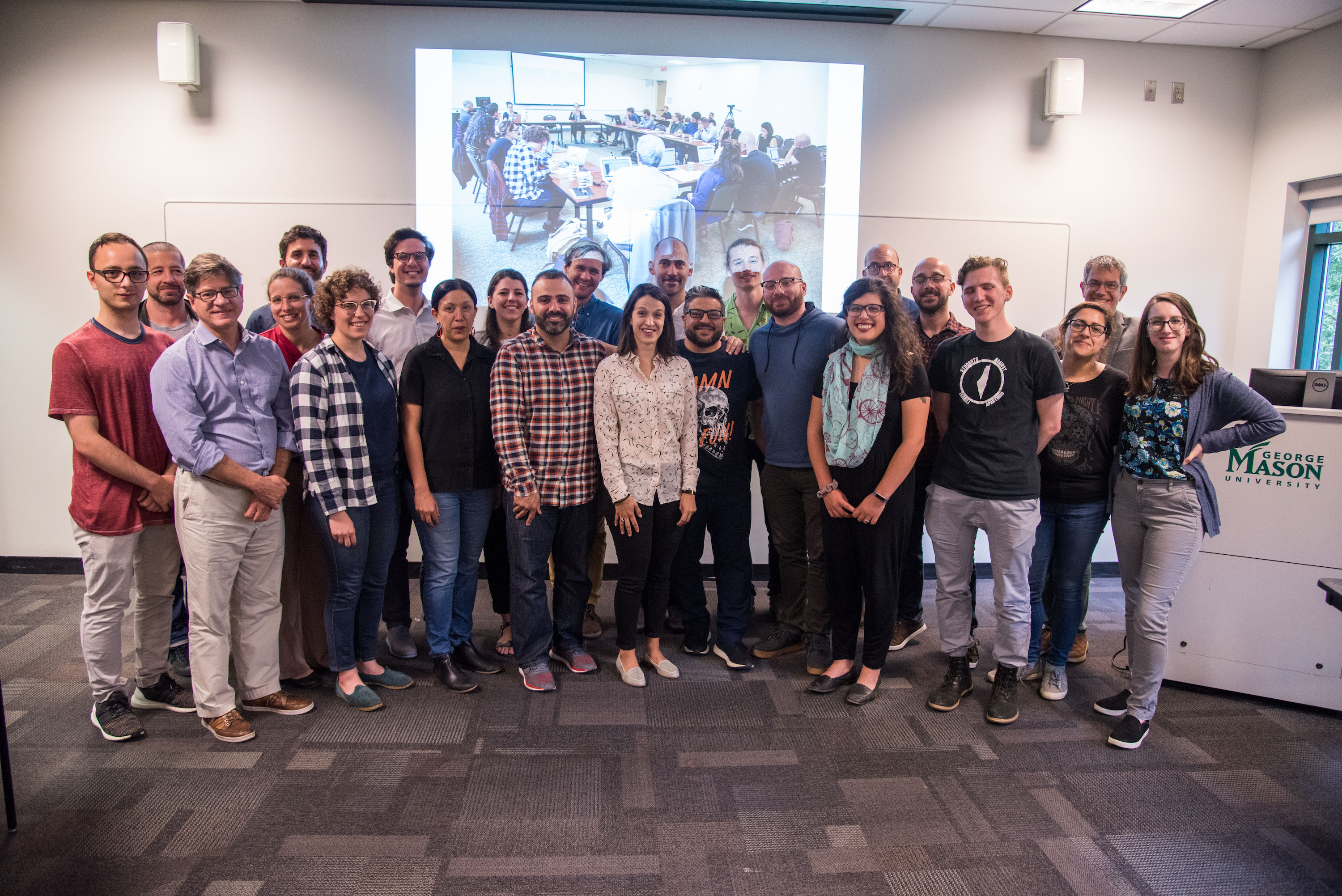
Samer Abboud from Villanova University led the fourth workshop session of the day, discussing perspectives on the intersections between the field of Critical Security Studies and political economy. He began by contextualizing critical security studies within the development of discourse and what is called the ‘security-development nexus.’ In this way, it is possible to see how developmental interventions conjoin security concerns with questions of development. In doing so, his workshop shifted attention to the relationships between aid and security and how the exercise and commodification of violence is central to capital accumulation.
The first day of the Institute concluded with a public event for University of London SOAS Professor Adam Hanieh’s new book, Money, Markets, and Monarchies: The Gulf Cooperation Council and the Political Economy of the Contemporary Middle East. Building on his previous work focusing on the role of Gulf capital within global capitalism, Hanieh’s book argues for centering the Gulf as a territorial unit as a critical site of the international economy thus rejecting methodological nationalism and state-centric frameworks. Rather, by understanding the Arab Gulf states as representing cross-border processes of capital accumulation, Hanieh finds that the analytical vantage point of the Gulf opens doors to better understanding global capitalism.
War II, Moore demonstrated the historical fluidity of the concept, and its malleability as an analytical framework. Moore critiqued some dominant approaches to war economies, while positing the question of whether or not primitive accumulation is a sufficient explanation for what war economies frameworks try to explain. Moore goes further, discussing the ways in which new methods of financing war necessitates new approaches, focusing on questions of war as a generative enterprise.
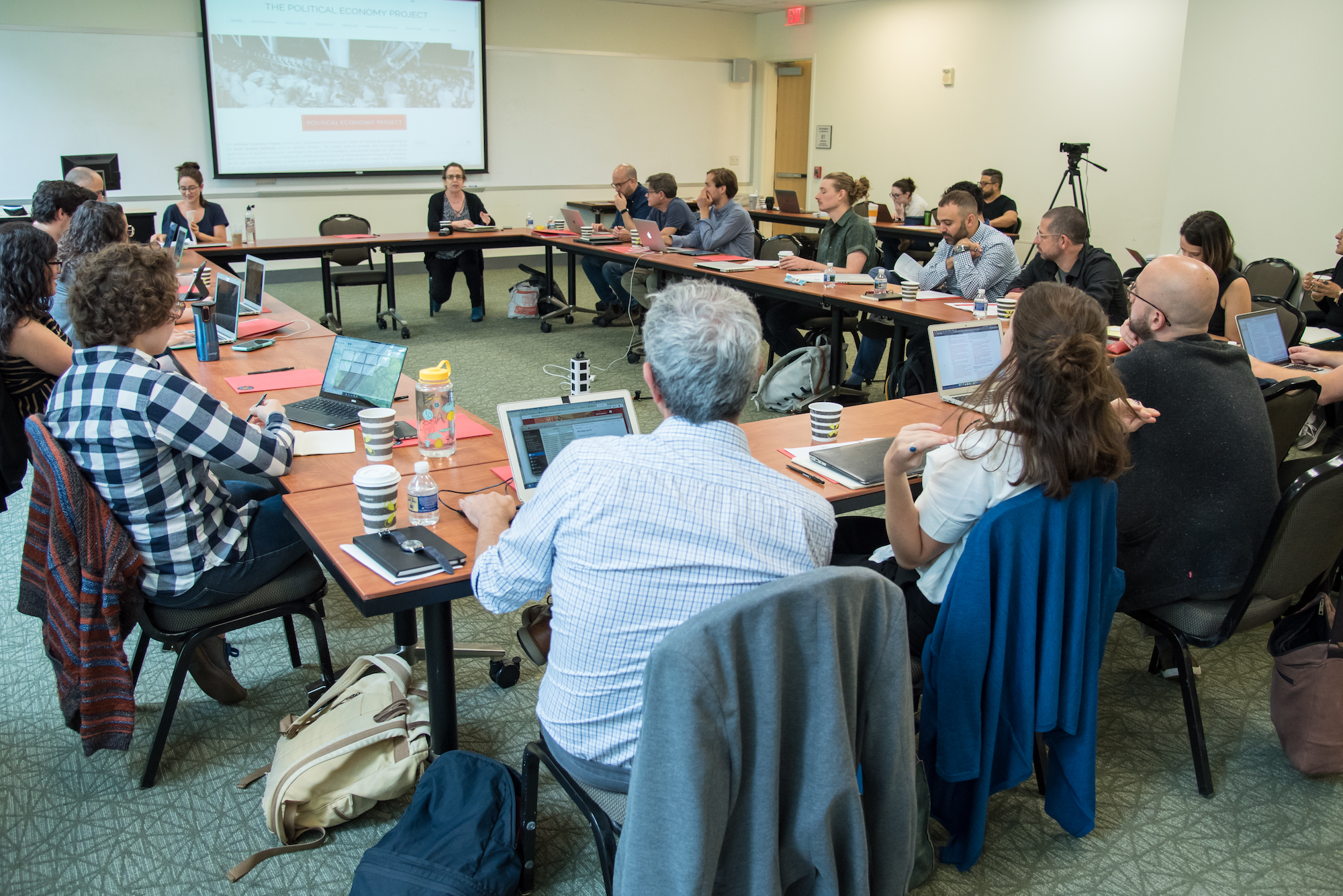
Fellows then participated in the first breakout session, where they presented their work to a small number of colleagues and faculty. Through feedback and constructive criticism, these three sessions spread out over PESI, gave fellows the opportunity to further develop their arguments and methods in an intimate and collaborative space by expanding their understanding of the various dimensions of political economy while strategically focusing attention on critical processes.
The second day of PESI was kicked off by Pete Moore whose session focused on War Economy. Bassam Haddad then presented on the Political Economy Pedagogy Module, a project that culminates the efforts to challenge and critique political economy and shape pedagogy. Operating under the umbrella of the Arab Studies Institute (ASI), this initiative intersects with two other ASI projects, the Middle East Studies Pedagogy Initiative (MESPI) and the Knowledge Production Project (KPP). Haddad updated faculty and fellows on the development of these projects, highlighting successes as well as charting the future, and encouraging the participants to take part in the operations of ASI.
Max Ajl of Cornell University then presented on the Rural Question and Peasant Economy. Ajl argues that imperial discourse obscures the relevance of the agrarian question in the Middle East and North Africa, and advocates for breaking away from imperial knowledge structures. Instead, Ajl surveys the evolution of the agrarian question throughout the last century as a question of resistance and development for colonized societies, demonstrating the analytical linkages built between the peasantry and capital by those advocating for national liberation.
The final session of the second day was a public panel held by Pete Moore, Rafeef Ziadah, Kareem Rabie, Muriam Haleh-Davis, whose interventions revolved around the panel title Neoliberalism: What it Is and What it Is Not. With Haddad as moderator, the participants contributed to a conversation on both the strengths and weakness of contemporary understandings of neoliberalism. The panel sought to challenge current discourses on neoliberalism by re-examining historical processes and complicating understandings of capital development.
The third day began with Ohio University’s Ziad Abu-Rish presenting on State Formation and Market Development. As part of the efforts at modernization, political powers in the Middle East started practicing modern forms of statecraft, a process unintelligible without considering the role of colonialism throughout the 20th Century. This line of critical thinking allows room for re- examining state failure and the attendant typologies of state formation that have arisen. Abu-Rish also highlighted the need for more scholarship to flesh out the connection between state formation and the world market.
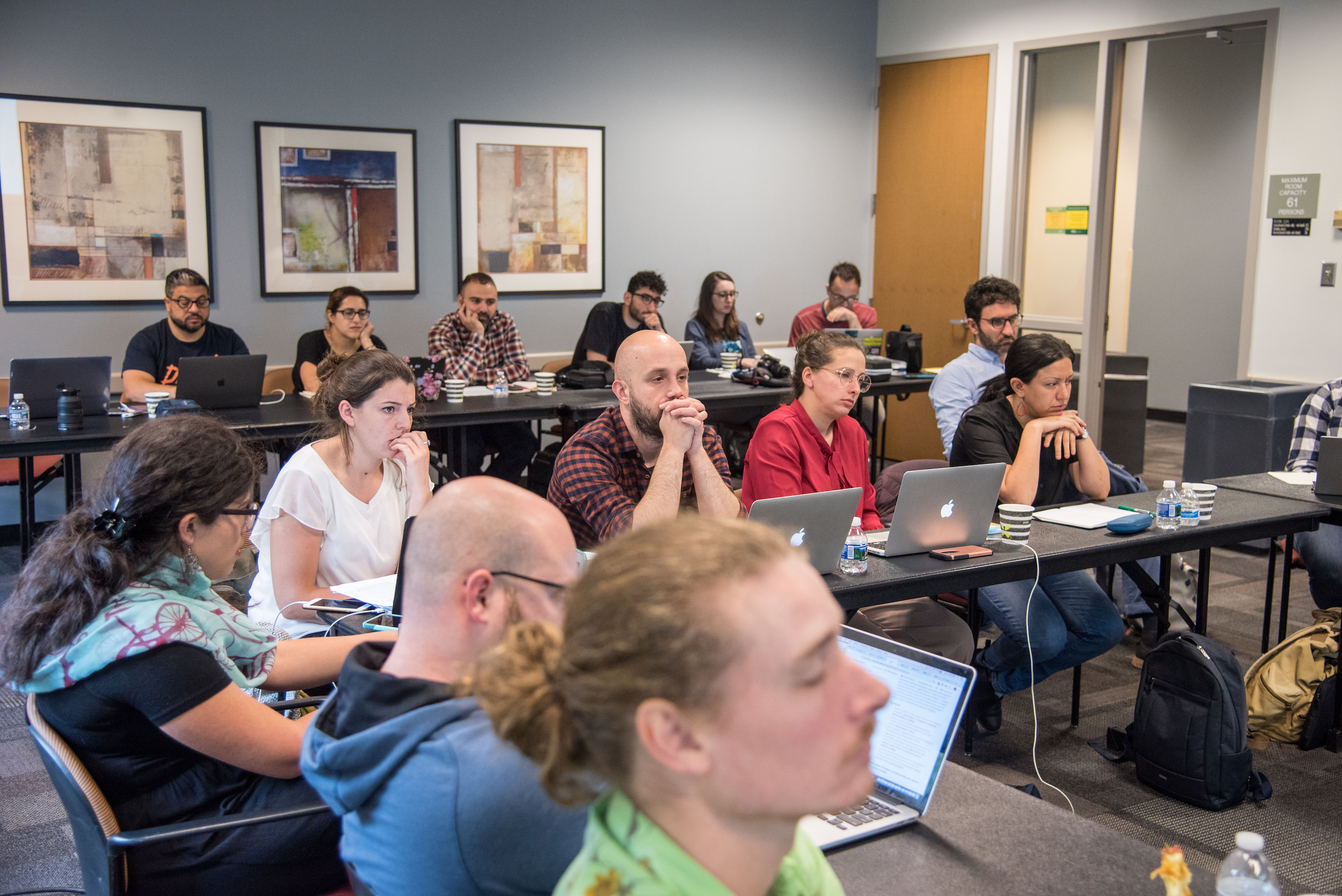
Next, Kareem Rabie led a discussion on Housing, Urbanism, and Social Reproduction. Rabie demonstrated how the urban method is one way to look at uneven development, and begins to answer the question of what happens when capital begins penetrating communities. Finding fault in an over- emphasis on labor in the question of the production of social relations, Rabie brings in the consumer as another agent of this process. Rabie’s session encouraged participants to think of how economic relations are not separate from social relations, and how economic reproduction is co-constitutive of social reproduction.
After another round of breakout sessions, Hanieh brought the third day to a close with a workshop on Finance Capital and Financialization of the World Economy. Operating within a Marxist framework, Hanieh roots the emergence of the contemporary financial system to the disruption of global power relations in the post-war period. In his analysis, Hanieh links the gradual institutionalization of finance capitalism to the progression of colonial relations, as debt and other financial tools continue to dominate post-colonial societies.
The fourth and final day of the Institute began with Rafeef Ziadah from the University of London SOAS, leading a discussion on Circulation, Infrastructures, and Logistics in the Global Economy. Ziadah attempts to grapple with global capitalism and political economy by considering transnational networks between centers of logistics, infrastructures, and circulation of commodities and capital. Though she demonstrates the value of this literature in better understanding the transnational connections of global capitalism in a systematic and institutional manner, she finds the literature limiting in its focus of advanced economies and failure to sufficiently consider the question of uneven labor relations.
Ziadah’s workshop was followed by a final participant breakout session before a working lunch where fellows and faculty continued networking. Haddad then brought PESI 2019 to a conclusion, giving each fellow their certificate of completion and facilitating a feedback discussion.
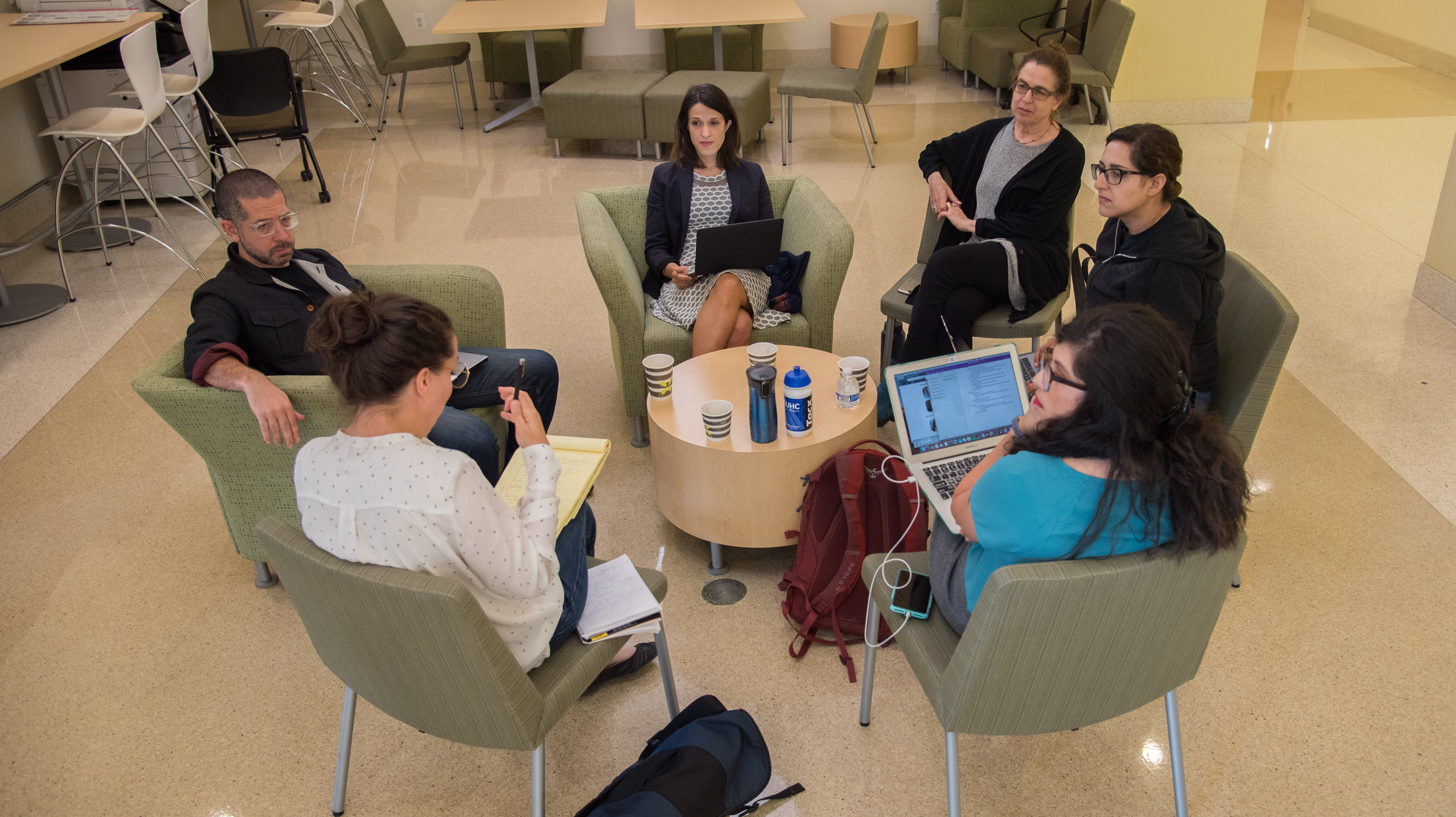
POLITICAL ECONOMY PROJECT NETWORK
Since 2015, the Political Economy Project (PEP) has fostered collaborations between scholars, researchers, and students throughout the world. The PEP continues today to build multidisciplinary research networks with the aim of interrogating dominant paradigms, encouraging critical approaches to political economy, and ultimately providing insights for alternatives. The 2019 Political Economy Summer Institute (PESI), which marks the fourth annual Institute held by PEP, is evidence of PEP’s growing capacities to foster critical scholarship on the political economy of the Middle East and beyond.
For four days of immersive study (June 7-10) at George Mason University, fellows and faculty leaders were brought together to develop projects and dissertations, sharpen analytical tools and methods through workshops, and most importantly cultivate a community of critical scholars of political economy. By engaging in intensive discussions of key texts in critical political economy, curated by faculty leaders, participants were able to integrate topics such as imperialism, state formation, and labor into a multidisciplinary understanding of political economy reflective of the field’s methodological pluralism and its fundamental critique of capital and empire.In rejecting the common bifurcation of the intellectual and the political, PESI embraces the purpose of influencing pedagogical approaches and critiquing power through advocating crucial alternatives to dominant notions of growth, development, redistribution, and social justice.
[Click on the image above to download the PESI 2019 Brochure.]
POLITICAL ECONOMY PROJECT NETWORK
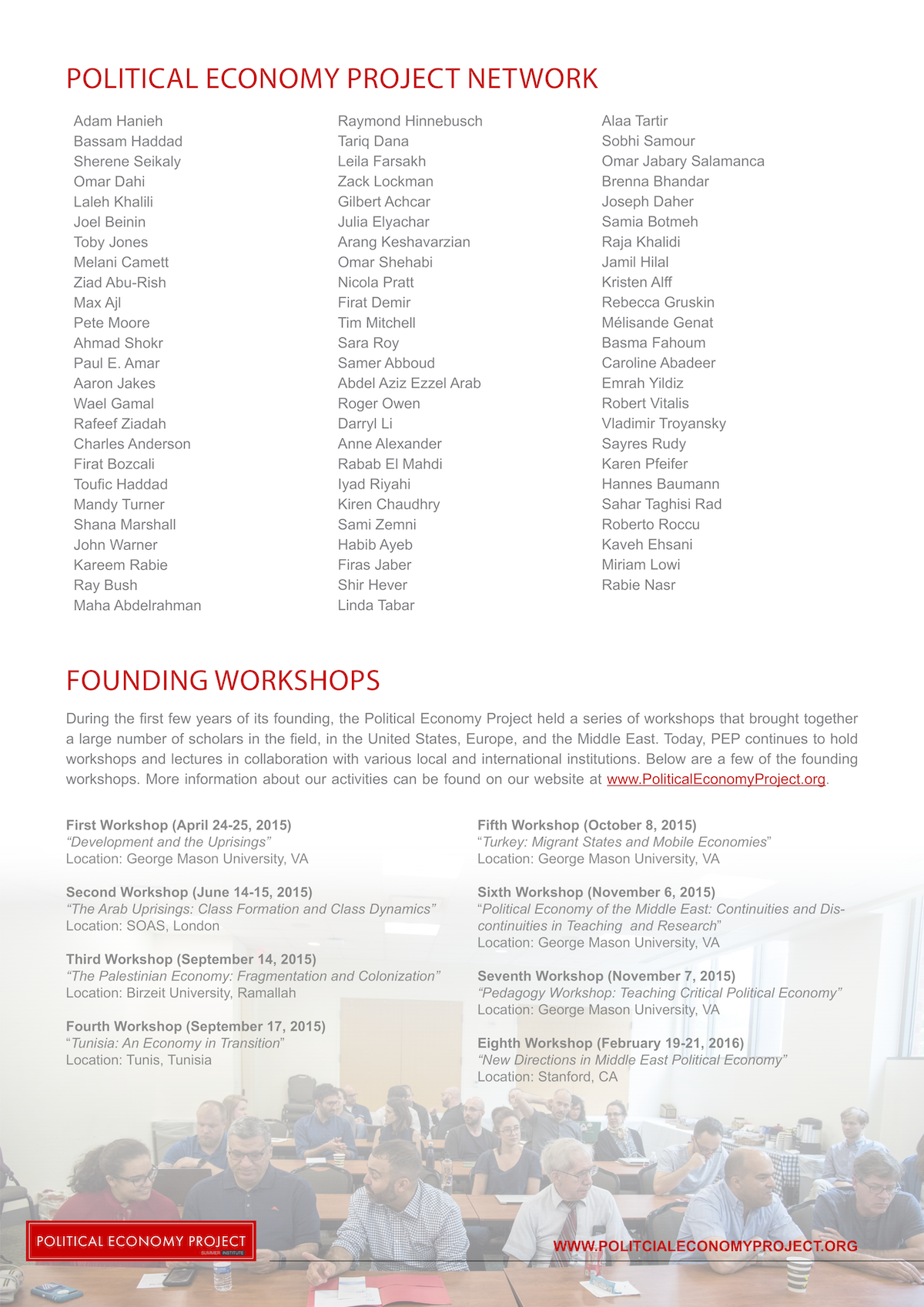
[The deadline for applying to the Summer 2020 Political Economy Summer Institute is 31 October 2019. The call for proposals can be found here.]
